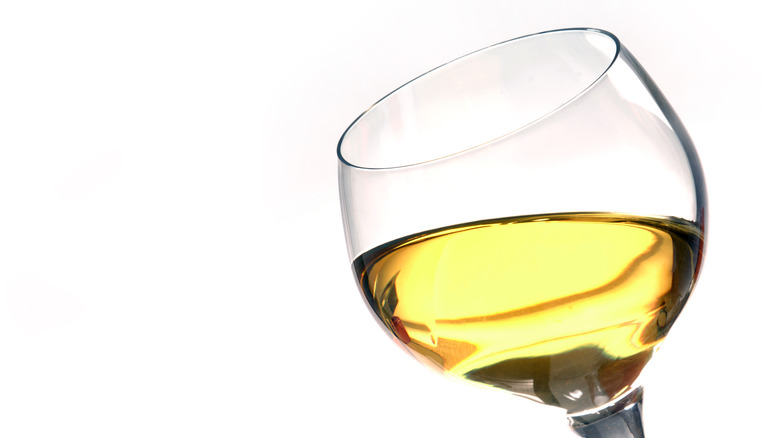What Are Sulfites In Wine?
If you're a casual wine drinker, you've likely heard of sulfites. After all, many wine labels have the words "contains sulfites" written on them. But you may not be so clear on why they're there, or what they do.
In short, "sulfites" is another term for the chemical compound sulfur dioxide. While a form of sulfur in your wine might not sound great, this compound occurs naturally — although it can also be added to some food and drink products — and food safety agencies broadly consider sulfites to be acceptable and even useful in these kinds of consumer products. In wine, they occur naturally, since they're generated during the fermentation process, and they act as a preservative. They protect the wine from bacteria and stop it from oxidizing (a process that turns wine into a vinegary brown substance that would be highly unpleasant to drink), so they're a necessary part of the winemaking process.
Where you'll find sulfites
White and sweet wines tend to have more sulfites than rosé or red options, but they're also quite common in other foods and drinks. Sulfites are used as a preservative in foods like dried fruits, fruit and vegetable juices, cereals, cornstarch, vinegar, processed fruit products, and processed potato products like french fries and dehydrated mashed potatoes, just to name a few places they pop up.
Wines and other products must be labeled as containing sulfites if they have sulfite levels equal to or more than 10 parts per million, which means 10 milligrams per liter of wine. Although sulfites have been mistakenly misrepresented as bad by some well-meaning health-conscious consumers (more on that later), sulfite-free wine simply doesn't exist. Sulfites occur naturally during the winemaking process, and they're absolutely necessary for wines that are going to be cellared or aged at all, otherwise, the wine would just go bad. That said, it's possible to find lower-sulfite wine. For example, organic wines in the United States cannot have additional sulfites added to them; the descriptions "natural" or "low intervention" may also be used on lower-sulfite wines.
Are sulfites bad?
Sulfites sometimes get a bad rap as something to avoid in your food, as they can cause headaches and allergy-like reactions. This is not really true: Around 1% of the population suffers from sulfite sensitivity, according to WebMD, and it should be pretty clear if this applies to you. If you have asthma, it's a little more likely, with 5% of asthma sufferers being sensitive to sulfites. Most of those who are sensitive will have trouble breathing, but other symptoms can include hives on your skin and digestive problems. If this applies to you, simply look out for the words "Contains sulfites" on wine bottles and food packaging, and avoid them. If it doesn't apply, dieticians say there's no harm from sulfites and no need to avoid them. If you're not sure, consult a doctor.
Another misconception about sulfites in wine is that they cause headaches (somewhat strangely, this tends to be associated with red wines, which contain fewer sulfites than white wine). Studies have debunked this, and even people who are sulfite-sensitive don't suffer headaches from drinking wine with them. If you're getting wine headaches, it could be from the dehydrating effect of alcohol, so you're better off just staying hydrated instead of seeking out sulfite-free wine.


